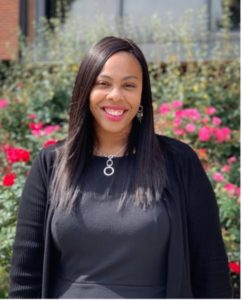Shavonne Shorter had big plans for her career.
“Originally I wanted to be Oprah,” said Shorter, whose college advisor suggested she have a Plan B, just in case.

In her new position at UMW, Shavonne Shorter is working to build the Office of Diversity, Equity and Inclusion. The essence of her job, she said, “is just about doing the right thing.”
That alternate route – maybe a little less glitzy but still just as lofty – began to shore up at Frostburg State University, where a fellow Black student delivered an orientation address with such verve, Shorter needed to know what courses she was taking. The answer – communication studies – was like looking into a mirror.
“I saw myself in her,” Shorter said. “That day I found my major.”
She went at it full tilt, earning bachelor’s, master’s and doctoral degrees in the area of communication, all of which she brought to her George Washington Hall office early this year. As UMW’s new associate provost for equity and inclusion, and chief diversity officer, she hit the ground running, immersing herself in campus culture, drilling down on strategic goals, and meeting with students, faculty and staff.
“My job is to work with everyone,” said Shorter, who’s committed to strengthening Mary Washington’s ASPIRE values and forming affinity groups. “It’s an all-encompassing role.”
So was the role she played throughout her own education, earning a spot at Frostburg in the McNair Scholars Program, preparing underrepresented students for doctoral studies. “If being a communication major changed my life,” Shorter said, “McNair changed my world.”
The wealth of experience she gained led to a Ph.D. from Purdue University and an associate professorship at Bloomsburg University, where she taught communication and landed the title of special assistant to the president for diversity, equity and inclusion.
“This work,” she said of her career path, “is just about doing the right thing, working toward equity for everyone.”
Q: How does your communication background complement diversity, equity and inclusion?
A: Communication is the building block of life. If you hone it early, you can develop your voice so that nobody else has to speak for you. It allows you to be your authentic self.
Q: What have you learned about UMW students?
A: They’re phenomenal. Their passion for social justice is amazing; it’s on a whole new level. I love working with them.
Q: What’s the most rewarding part of your job?
A: Seeing people accomplish their dreams, whatever that looks like to them. When a student gets an A on an assignment that we worked on that was hard for them. Supporting a professional who gets a promotion. Seeing people happy and fulfilled.
Q: What’s most challenging?
A: Finding the hours you need in a day. There’s so much opportunity and finite time. True change doesn’t happen overnight. It takes time and a collective effort.
Q: What’s meaningful in your office?
A: My communication books from when I taught at Bloomsburg, my Black Graduate Student Association award from Purdue, my debate timers from my days as coach. It’s important to me to have reminders of where I’ve been, to reflect on the path I’ve taken.
Q: What would people be most surprised to learn about you?
A: I’m a diehard Baltimore Ravens fan. It’s a family tradition.
Q: Mottos you live by?
A: My great-grandmother said that when you treat people well, it comes back to you. That’s how I want to live my life, helping folks in whatever they’re going through – personally, professionally, spiritually and more.
Learn about ways you can add your voice to the conversation by visiting Greetings from your Chief Diversity Officer in today’s EagleEye.